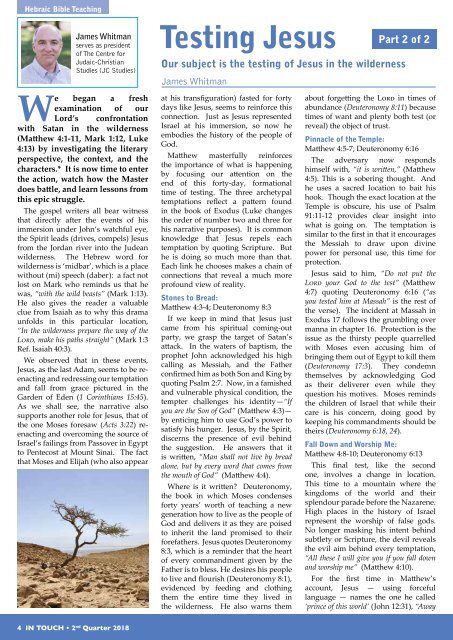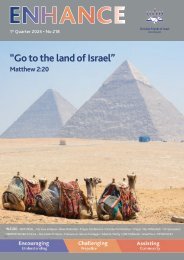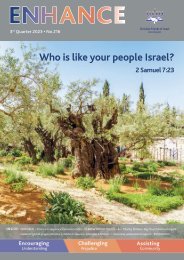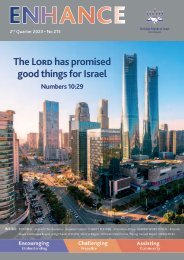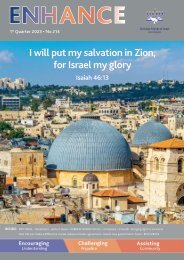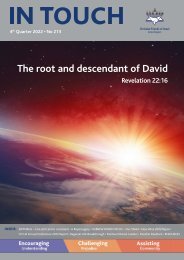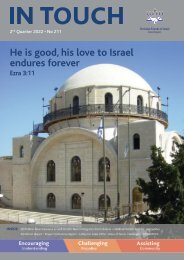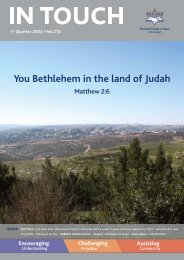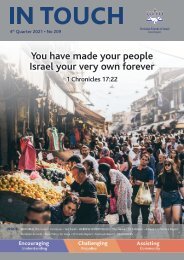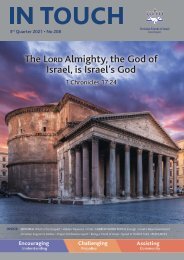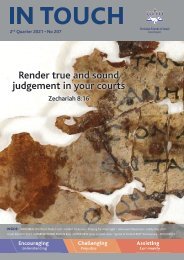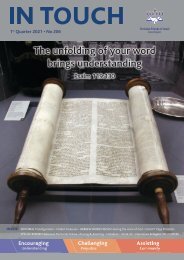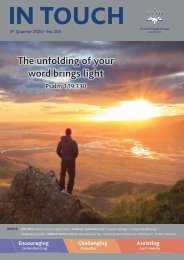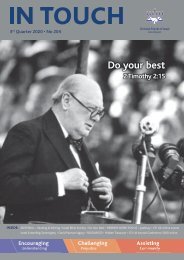In Touch Quarter 2 - 2018
Create successful ePaper yourself
Turn your PDF publications into a flip-book with our unique Google optimized e-Paper software.
Hebraic Bible Teaching<br />
James Whitman<br />
serves as president<br />
of The Centre for<br />
Judaic-Christian<br />
Studies (JC Studies)<br />
We began a fresh<br />
examination of our<br />
Lord’s confrontation<br />
with Satan in the wilderness<br />
(Matthew 4:1-11, Mark 1:12, Luke<br />
4:13) by investigating the literary<br />
perspective, the context, and the<br />
characters.* It is now time to enter<br />
the action, watch how the Master<br />
does battle, and learn lessons from<br />
this epic struggle.<br />
The gospel writers all bear witness<br />
that directly after the events of his<br />
immersion under John’s watchful eye,<br />
the Spirit leads (drives, compels) Jesus<br />
from the Jordan river into the Judean<br />
wilderness. The Hebrew word for<br />
wilderness is ‘midbar’, which is a place<br />
without (mi) speech (daber): a fact not<br />
lost on Mark who reminds us that he<br />
was, “with the wild beasts” (Mark 1:13).<br />
He also gives the reader a valuable<br />
clue from Isaiah as to why this drama<br />
unfolds in this particular location,<br />
“<strong>In</strong> the wilderness prepare the way of the<br />
Lord, make his paths straight” (Mark 1:3<br />
Ref. Isaiah 40:3).<br />
We observed that in these events,<br />
Jesus, as the last Adam, seems to be reenacting<br />
and redressing our temptation<br />
and fall from grace pictured in the<br />
Garden of Eden (1 Corinthians 15:45).<br />
As we shall see, the narrative also<br />
supports another role for Jesus, that of<br />
the one Moses foresaw (Acts 3:22) reenacting<br />
and overcoming the source of<br />
Israel’s failings from Passover in Egypt<br />
to Pentecost at Mount Sinai. The fact<br />
that Moses and Elijah (who also appear<br />
Testing Jesus<br />
at his transfiguration) fasted for forty<br />
days like Jesus, seems to reinforce this<br />
connection. Just as Jesus represented<br />
Israel at his immersion, so now he<br />
embodies the history of the people of<br />
God.<br />
Matthew masterfully reinforces<br />
the importance of what is happening<br />
by focusing our attention on the<br />
end of this forty-day, formational<br />
time of testing. The three archetypal<br />
temptations reflect a pattern found<br />
in the book of Exodus (Luke changes<br />
the order of number two and three for<br />
his narrative purposes). It is common<br />
knowledge that Jesus repels each<br />
temptation by quoting Scripture. But<br />
he is doing so much more than that.<br />
Each link he chooses makes a chain of<br />
connections that reveal a much more<br />
profound view of reality.<br />
Stones to Bread:<br />
Matthew 4:3-4; Deuteronomy 8:3<br />
If we keep in mind that Jesus just<br />
came from his spiritual coming-out<br />
party, we grasp the target of Satan’s<br />
attack. <strong>In</strong> the waters of baptism, the<br />
prophet John acknowledged his high<br />
calling as Messiah, and the Father<br />
confirmed him as both Son and King by<br />
quoting Psalm 2:7. Now, in a famished<br />
and vulnerable physical condition, the<br />
tempter challenges his identity—“If<br />
you are the Son of God” (Matthew 4:3)—<br />
by enticing him to use God’s power to<br />
satisfy his hunger. Jesus, by the Spirit,<br />
discerns the presence of evil behind<br />
the suggestion. He answers that it<br />
is written, “Man shall not live by bread<br />
alone, but by every word that comes from<br />
the mouth of God” (Matthew 4:4).<br />
Where is it written? Deuteronomy,<br />
the book in which Moses condenses<br />
forty years’ worth of teaching a new<br />
generation how to live as the people of<br />
God and delivers it as they are poised<br />
to inherit the land promised to their<br />
forefathers. Jesus quotes Deuteronomy<br />
8:3, which is a reminder that the heart<br />
of every commandment given by the<br />
Father is to bless. He desires his people<br />
to live and flourish (Deuteronomy 8:1),<br />
evidenced by feeding and clothing<br />
them the entire time they lived in<br />
the wilderness. He also warns them<br />
Part 2 of 2<br />
Our subject is the testing of Jesus in the wilderness<br />
James Whitman<br />
about forgetting the Lord in times of<br />
abundance (Deuteronomy 8:11) because<br />
times of want and plenty both test (or<br />
reveal) the object of trust.<br />
Pinnacle of the Temple:<br />
Matthew 4:5-7; Deuteronomy 6:16<br />
The adversary now responds<br />
himself with, “it is written,” (Matthew<br />
4:5). This is a sobering thought. And<br />
he uses a sacred location to bait his<br />
hook. Though the exact location at the<br />
Temple is obscure, his use of Psalm<br />
91:11-12 provides clear insight into<br />
what is going on. The temptation is<br />
similar to the first in that it encourages<br />
the Messiah to draw upon divine<br />
power for personal use, this time for<br />
protection.<br />
Jesus said to him, “Do not put the<br />
Lord your God to the test” (Matthew<br />
4:7) quoting Deuteronomy 6:16 (“as<br />
you tested him at Massah” is the rest of<br />
the verse). The incident at Massah in<br />
Exodus 17 follows the grumbling over<br />
manna in chapter 16. Protection is the<br />
issue as the thirsty people quarrelled<br />
with Moses even accusing him of<br />
bringing them out of Egypt to kill them<br />
(Deuteronomy 17:3). They condemn<br />
themselves by acknowledging God<br />
as their deliverer even while they<br />
question his motives. Moses reminds<br />
the children of Israel that while their<br />
care is his concern, doing good by<br />
keeping his commandments should be<br />
theirs (Deuteronomy 6:18, 24).<br />
Fall Down and Worship Me:<br />
Matthew 4:8-10; Deuteronomy 6:13<br />
This final test, like the second<br />
one, involves a change in location.<br />
This time to a mountain where the<br />
kingdoms of the world and their<br />
splendour parade before the Nazarene.<br />
High places in the history of Israel<br />
represent the worship of false gods.<br />
No longer masking his intent behind<br />
subtlety or Scripture, the devil reveals<br />
the evil aim behind every temptation,<br />
“All these I will give you if you fall down<br />
and worship me” (Matthew 4:10).<br />
For the first time in Matthew’s<br />
account, Jesus — using forceful<br />
language — names the one he called<br />
‘prince of this world’ (John 12:31), “Away<br />
4 IN TOUCH • 2 nd <strong>Quarter</strong> <strong>2018</strong>


